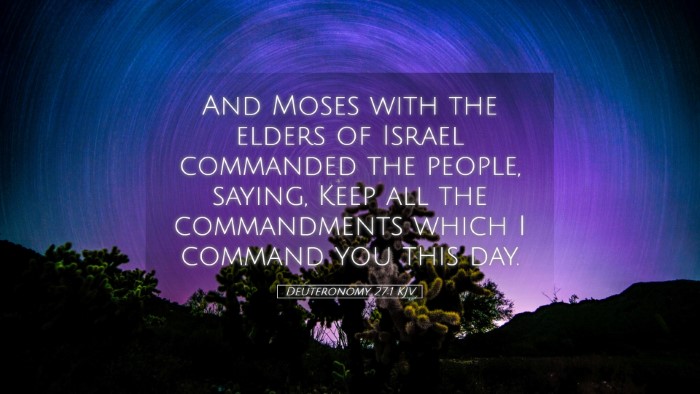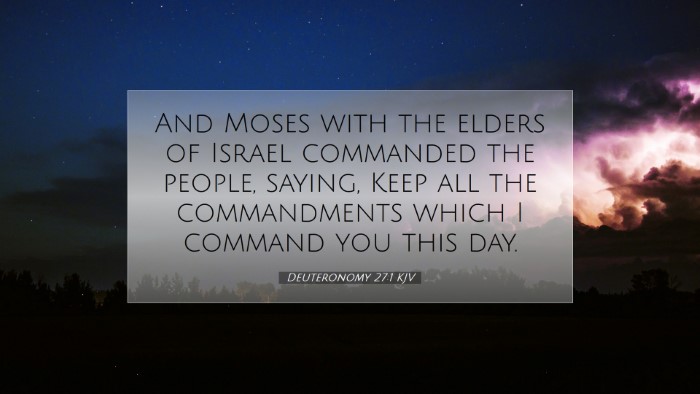Deuteronomy 27:1 states: “Now Moses and the elders of Israel commanded the people, saying, ‘Keep all the commandments which I command you this day.’” This verse serves as a pivotal moment in the life of Israel, representing both a command for obedience and a communal commitment under the Law of God.
Contextual Overview
The context of Deuteronomy marks the culmination of Moses' leadership and the preparation of Israel to enter the Promised Land. This book functions as a recap of earlier laws and events, providing clarity and urging the people towards fidelity to God’s commands.
The Authority of Moses and the Elders
Moses, as the appointed leader, emphasizes the importance of recognizing God's Law. Matthew Henry notes that the elders of Israel are involved here to indicate a collective responsibility within the community. Their role underscores the significance of communal leadership in sustaining spiritual and moral integrity among the people.
Albert Barnes highlights that the simple phrase “Now Moses and the elders” denotes a serious, covenantal setting, stressing that the people are not merely being given laws, but are entering into a sacred agreement with the Almighty.
The Command to Keep the Law
The command to “keep all the commandments” resonates throughout the Old Testament, suggesting not only adherence to the letter of the law but also an alignment of the heart towards God. Adam Clarke emphasizes that this obedience is to be seen as a whole-hearted response to God's holiness.
- Holistic Obedience: The call is not selective; it mandates an all-encompassing commitment to God's Word.
- Involvement of the Community: The joint declaration by Moses and the elders of Israel conveys a message about communal accountability before God.
The Relevance of the Command Today
This command in Deuteronomy holds profound implications for modern believers. It encourages leaders within the church to uphold God's standards and guides congregations towards unwavering faithfulness.
Henry comments on the enduring nature of God’s commandments; they are meant to be passed down and instilled in every generation, ensuring that the covenant community remains anchored in divine truth.
Theological Implications
The command to keep the Lord’s commandments speaks to the nature of God’s covenant - a relationship characterized by obedience, blessings, and the consequence of disobedience. Clarke notes that blessings are contingent upon this obedience, framing the Law as participatory rather than burdensome.
Furthermore, the command implies that the path of worship and obedience is not individualistic but is to be expressed collectively. Israel's obedience is a testimony to God’s faithfulness and character.
Calls for Reflection
Moses’ command invites deep self-reflection concerning the adherence to God's laws not merely as ancient historical commands but as directives that influence present-day faith and practice. Pastors and theologians should encourage their congregations to understand the broader implications of living out God's commandments in community.
- Examine Personal Obedience: Believers should critically assess their own lives to ensure congruence with biblical teachings.
- Cultivate Community Accountability: Church bodies should foster an environment where accountability in adherence to commandments is encouraged.
Conclusion
In conclusion, Deuteronomy 27:1 serves not merely as a historical account but as a timeless exhortation for reverence towards God's commandments. It signifies a solemn call to obedience that resonates deeply within both the corporate body of the church and the individual believer’s life. As leaders and followers, the challenge persists to uphold, teach, and embody God’s laws, ensuring that they remain vibrant in faith communities today.


